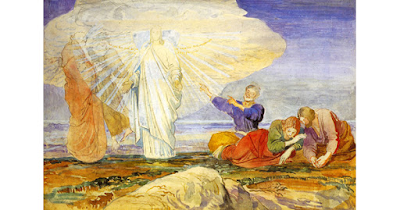Second Sunday of Lent
✠ | CLICK TO VIEW TODAY'S READINGS
It is hard to trust someone you do not know. That is why the story of the sacrifice of Isaac challenges many of our human sensibilities. We rightly might ask, “What sort of G-d would make such a request?” or “What sort of man must Abraham have been to entertain such a command?” However, Abraham knows G-d and that is why many Jewish scholars have opined that in fact G-d never intended for Abraham and Abraham knew that g-d never intended for him to make such a sacrifice. Rather the story itself was intended to impeach the practice of human sacrifice by the pagans. In the ancient world human sacrifice was not unusual. Indeed, closer to home, human sacrifice was not uncommon among the Aztecs as late as the 16th century. It was viewed as a means to both give thanks and also appease the anger of the gods.
Christians also might ask ourselves what kind of G-d wills for his Son to suffer and die? Immediately before the Transfiguration which we read in the Gospel today Jesus says “the Son of Man must suffer many things and be rejected by the elders, the chief priests and the teachers of the law, and that he must be killed and after three days rise again” Mk 8:31-32. So what is going on here? Do god(s) or at least religions promote a sort of blood lust? Perhaps this explains a popular mindset that religion does seem to be at the root of all wars. It’s easy to understand why so many would say they want no part of god(s) or religion(s).
Perhaps if we are asking ourselves these questions it betrays that we really do not know G-d. The point of departure for the believer is found in Paul’s letter to the Romans, “If God is for us, who can be against us?” Do I believe that G-d is for me?
Genesis and Saint Mark’s Gospel point to that reality. In Genesis it is perhaps Abraham who is testing God. He knows the goodness and graciousness of the Lord but is disturbed and does not understanding the destruction of Sodom and Gomorrah. Thus Abraham trusts that somehow the Almighty might not destroy creation and is testing to see how Isaac’s life will be saved. In fact, we see how the Lord provides by preventing the sacrifice of Isaac and instead substituting the sacrifice of a ram.
The placement of the Transfiguration in the Gospel is the Lord’s encouragement to Peter, James and John. Just prior to this passage Jesus instructs the disciples in the centrality of the Cross. Peter is horrified. He goes so far to try to dissuade Jesus. The response, “Get behind me Satan” for suggesting that Christ abandon the cross. Peter’s reaction is reflective of our own attitudes. It betrays our lack of knowledge of G-d. Interestingly, Peter only a few verses later is among the three disciples whom Jesus selects to reinforce for us all that death is not the last word. He is reminded as we are reminded that fidelity and trust in G-d leads to life eternal. Moses and Elijah were not dead. Rather they were in glory together with Christ. The message to the Apostles was clear trusting in G-d leads to glorification in Christ Jesus.
The readings today serve as a reminder for me that if I know G-d I will trust and give all unreservedly to the Lord even without understanding. This means that as I face the frustrations, anger and even sorrows of this pandemic I trust that G-d is walking with me. It means serenity in the face of the economic circumstances that make work challenging and the ability to pay bills so difficult. It means patience with those whom I am living in close quarters with and not giving way to sarcasm or forms of escapism. It means not shirking my work even when far from my supervisors peering gaze. It means finding the time and space to speak to G-d even when I have neither the inclination nor the energy. When I know G-d, I can trust G-d even when I do not understand because of the peace of knowing G-d is for me!
As we read the Sacred Scriptures it seems that G-d neither commanded nor wished the death of Isaac. It was not the Father’s “plan” that his Son hang upon a tree. Rather the Eternal Father promises us that if we remain faithful as did Abraham and face the cross as did Christ, we can be sure that we to will be given all that is needed for us to share in the glory of the Transfiguration.


Comments
Post a Comment